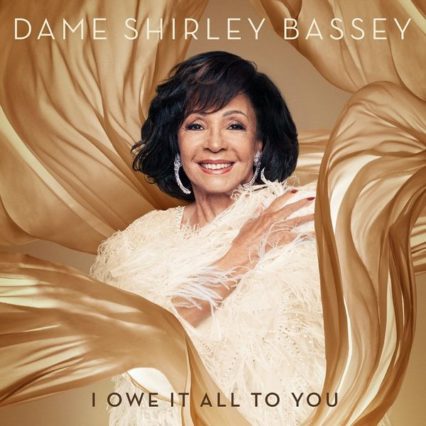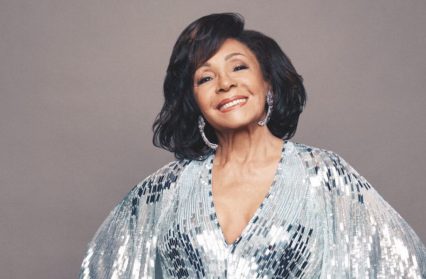Shirley Bassey has released her final album, seven decades after her debut. I Owe It All To You has all the trademark flourishes you might expect from the queen of the divas, but, as Gary Raymond explains here, this is an album that sits well with the great goodbye albums of recent years.

There is most likely not a long history of articles that include the names of both Dame Shirley Bassey and David Bowie, and I have to admit I didn’t embark on engaging with the new album from the former anticipating the resulting review would reference the latter. But there it is. Listening to Bassey’s purported swansong, I Owe It All To You, I kept coming back to the experience of Bowie’s final two albums before his premature death at the age of 69 in 2016. Just like Bowie – who constructed arguably one of the finest goodbyes in the history of conceptual art with Black Star, the album released just before his death and interpreted immediately as a purposeful farewell – Bassey is drawing an epic close to her career with a carefully crafted selection of songs. Each track is threaded with familiar motifs and nods that fan muscle-memory will twitch at the sound of. To this extent, the Bowie and Bassey albums are, ultimately, related by blood, by the slowing of it, by the one-last heating up of it. They are cousins, driven by the same desire for neat endings.
In I Owe It All To You, the 83-year old Bassey is bringing down the curtain on her career, and hopefully nothing more terminal than that, and she’s doing it in a heal-kicking schmaltz assault that attempts, albeit with varying degrees of success, to reference many aspects of her 70-odd-year recording career. She is bookending, thanking her fans, but also reminding us just how impressive her output has been, how consistently authentic, driven, and dedicated she has been to her music. And for that at least, it’s a very moving listening experience. Okay, so you can criticise it for a lack of adventure, for a lack of surprises, even for its anaesthetised production values, but what you have here is an album of poignant reflection from a singular artist who sings with a passion and poise in her ninth decade proving she has, quite simply, no peer.
Longevity is one thing, and it should not be sniffed at, but it shouldn’t be taken in isolation either. An artist of Bassey’s standing cannot hang on in a business-like the one she’s in my fingertips alone. She is not the product of an era when an artist might have just put out their own music without the permission and validation of various keepers of various gates. Every slate of the Bassey sound would have to promise a return. She has never been a bankrolled artist; no, she has been one of those big names who record companies bank on, one of the ones whose profits have no doubt enabled the more “serious” artistic statements of a thousand men whose albums bomb. There has been little gratitude for that so far as I can see. Talk of Bassey is more often than not tongue-in-cheek, like doing the thing she does just isn’t something to be taken seriously. She’s easily parodied, thought of as light entertainment, although she has outlasted all of the light entertainers who have done the parodying. No, there’s more to Bassey than the big dresses and big songs and wide arms, but even if there wasn’t, what would be so wrong with that?
On I Owe It All To You there is evidence of something she might not be remembered for subtlety, nuance. Mike Yarwood wasn’t parodying that side of her. Okay, so there are songs that won’t stick in the mind for long, like “I Made it Through Rain”, a song she’s apparently wanted to record for years and a song that seems to encapsulate the running theme of her career reflection: that she’s had a hard time of it and had to fight hard to succeed. That is undoubtedly true. It’s still astonishing the life a working-class black girl from Tiger Bay has fashioned for herself. She’s earned these moments of sentimentality.
And there’s no shortage of sentimentality on this album. But it’s not fake. This isn’t Shirley Bassey, contestant number 465, shuffling onto the talent show stage armed with a big voice and sob stories of a terminally sick relative who paid to put her through Fame Academy. Bassey is the real deal, and even as she slips her way through “Adagio”, you can’t help but feel the polish, the sheen, is hard-fought, is steeped in a form of showbusiness that ended its first phase with few survivors.
But back to the Bowie thing. Bassey has picked every song for this record to convey a message, and it isn’t simply to say thank you and goodnight. The arrangements tip a trilby to various stages of her career, including her early relationship with swing and blues. “You Aint Heard Nothing Yet” opens with the “New York, New York” refrain, reminding us she found her feet singing Sinatra’s “I’ve Got You Under My Skin” in 1959 after a quiet start of blues standards backed by Wally Stott on her 1957 debut Born to Sing the Blues. Her voice on these swing numbers is remarkable, lacking perhaps the mountain-moving range and depth of her peak, but it retains great strength. You have to wonder how long she could go on, but she’s not bowing out with any frailties she may have on display. She’s going out with a bang.
The production, polished and glitzy, actually has some swelling lush movements for people who get riled up by that sort of thing. “I Don’t Know What Love Is” is a stroll through the park for a vocalist as accomplished as Bassey, but it sounds so warm and confident it’s difficult to just dismiss it as filler. Her version of Willie Nelson’s “Always on My Mind”, one of the greatest songs in the popular canon, is perhaps one of the finest things she’s ever done. It knocks Elvis out of the park, leaves Vegas her and hers alone, and were live performances possible, and were she up for it, there wouldn’t be a dry eye in any house she chose to perform it in. On this track, she sounds her age, and it’s a beautifully vulnerable performance you might not have thought her capable of if you’d only ever seen her do the big numbers.
It’s in these quiet moments where the album is most affecting. Her cover of Beyonce’s “I Was Here” is almost unbearably poignant, Bassey the trailblazer wrapping her arms around the biggest female black star the world has ever known. If in 2020, this meeting of artists doesn’t put a lump in your throat, you haven’t been paying attention to what’s going on.
It isn’t all plain sailing, of course. Bassey never has been everyone’s cup of tea, and the songs will be too often a bit too “Broadway” for many (the album closes with a cover of John Miles’s “Music”, for goodness sake). Her cover of Queen’s “Who Wants to Live Forever” is ill-advised, although given Freddie Mercury’s penchant for bombast you have to wonder why she hasn’t covered him more. They seem well-suited. The track “Look But Don’t Touch” is a reference to her surprise collaboration with The Propellerheads for the 2000 hit “History Repeating” (a song I can do without being reminded of if I’m honest with you).
In a way, it’s a sad indictment on someone (not sure who… maybe all of us), that Bassey’s “goodbye” the album feels so awkward sitting in a conversation next to Bowie’s Black Star (and The Next Day), or Johnny Cash’s American IV, or Leonard Cohen’s You Want It Darker. Perhaps it’s because she’s a woman, maybe it’s because she’s Welsh, or perhaps it’s because cultural consumers who take themselves too seriously value greyness and grit above sequins and bombast. But sit with them Bassey’s swansong does. And just as moving as those albums were when ascended to their contexts, it’s difficult to see I Owe It All To You in any other company.
I Owe It All To You by Shirley Bassey is out now on Decca.
Gary Raymond is an editor and avid contributor to Wales Arts Review.
_______________________________________________________________________
Recommended for you:
100 Greatest Welsh Albums of All Time



 Enjoyed this article? Support our writers directly by buying them a coffee and clicking this link.
Enjoyed this article? Support our writers directly by buying them a coffee and clicking this link.







